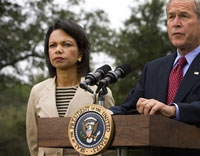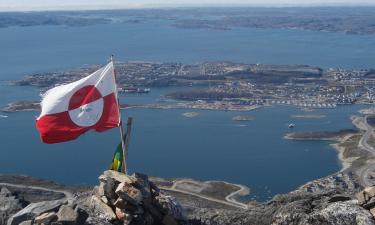If NATO punishes Russia, Russia will punish NATO back
US Secretary of State Condoleezza Rice said on her way to an emergency NATO foreign minister meeting on the crisis in South Ossetia and Georgia that the alliance would “punish Russia for its invasion of Georgia.” Western sources believe that Ms. Rice was talking about a suspension of defense cooperation. Russian experts say that Georgia is a uniting factor for NATO, and the alliance can stand up against Russia in a cohesive way.

Rice also said that Russia “was playing a very dangerous game” with the USA and its allies. The Secretary of State emphasized that the United States would not allow Moscow to win in Georgia, destabilize Europe and draw a new Iron Curtain through the continent.
"We are determined to deny them their strategic objective," Rice told reporters aboard her plane, adding that any attempt to re-create the Cold War by drawing a "new line" through Europe and intimidating former Soviet republics and ex-satellite states would fail.
"We are not going to allow Russia to draw a new line at those states that are not yet integrated into the trans-Atlantic structures," she said, referring to Georgia and Ukraine, which have not yet joined NATO or the European Union but would like to.
NATO ministers will also consider Georgia’s request about the comprehensive aid to restore the nation’s military and other infrastructure. NATO will send experts to Tbilisi to help the Georgian authorities to plan and organize the restoration of the destroyed infrastructure. These activities will begin only after Russia’s withdrawal from Georgia.
Russian experts believe that there can be only one positive outcome of the emergency NATO meeting for Russia. France, Italy, Slovakia, Turkey and several other countries interested in maintaining stable and normal relations with Russia may block the anti-Russian resolution.
This outcome, no matter how weak it may seem, would become a serious defeat for the diplomacy of the incumbent US administration. However, NATO’s spokeswoman Carmen Romero said that all the ministers of the alliance would make a clear statement of Georgia’s support.
Russian experts hope that NATO will find itself lost in contradictions between Anglo-Saxon hawks and Old European doves. It is not ruled out, though, that Paris, Berlin and Rome may waver this time. The USA has made its allies face a tough choice – either the USA or Russia.
Turkey may show Russia its support at the meeting. Turkey, which owns the third largest army in the alliance, did not allow US battleships enter the Black Sea during the armed conflict.
Slovakia and the Czech Republic also supported Russia in its military actions in South Ossetia. Slovak Prime Minister Robert Fico and vice speaker Anna Belousovova said that Georgia committed an act of genocide in South Ossetia. The two countries accused the US administration of inadequate behavior.
Russian President Dmitry Medvedev said that Russia would strike a destructive blow against any external force which may attack Russian citizens.
“If someone may think that they can murder our citizens, kill our soldiers and officers, who act as peacemakers, we will never let this happen. Anyone, who tries to do it, will face a destructive blow from Russia,”Medvedev told a group of WWII veterans in Kursk.
“Russia has economic, political and defense opportunities for such a response. No one has any illusions left on this matter,” he added.
Russia’s ambassador to NATO Dmitry Rogozin said that Russia had recalled its bid for an emergency meeting of the Russia-NATO Council.
“We do not consider it possible to wait for the first aid which does not arrive for a week already,” Rogozin said.
Afterwards, NATO’s press service declined a press conference of the Russian envoy in the Brussels headquarters. Rogozin’s meeting with journalists was supposed to take place on August 19.
NATO’s decision to cancel the meeting of the Russia-NATO Council on the situation in the Georgian-Ossetian conflict zone became the first sanction, which the alliance imposed against Russia. In addition, the alliance barred a Russian ship from joining its multi-national anti-terrorism exercise in the Mediterranean Sea.
In the meantime, Georgia has refused to accept Russia ’s humanitarian aid for the town of Gori.
A column of trucks of Russia’s EMERCOM set off to Gori from Tskhinvali on Monday. The trucks were carrying 50 tons of food – vegetables, grains, macaroni products and preserves.
The column arrived in Gori, and people began to unload the cargo, when a person, who introduced himself as a spokesman for the municipal administration, strongly ordered to cease the humanitarian action. The official said that the residents of Gori did not need any help from the outside. A crowd of people was standing near the trucks, expecting to receive the humanitarian aid. The trucks had to return to Tskhinvali unloaded.
Deputies of the Russian parliament had their holidays cut for one week because of the situation in South Ossetia . The first session of the State Duma devoted to the issue will take place on August 25, not September 3, as was previously scheduled.
Deputies will discuss questions of South Ossetia’s restoration and recognition of its independence. Experts say that Russia ’s President Medvedev will need to recognize the independence of the republic, although the decision will have no legal force anyway. Russia’s single-handed recognition of South Ossetia’s independence will entail absolutely no legal force for other countries.
In the meantime, the Union of Cable Television of Georgia informed the administration of Russia's RTVi channel of ending its broadcast in the country, Echo of Moscow radio station said.
It was the only Russian channel, the programs of which were broadcast in Georgia since the beginning of the armed conflict in South Ossetia.
Georgia decided to cease the broadcast of the channel after it aired an interview with Russia’s Foreign Minister Sergei Lavrov, who harshly criticized the actions of the Georgian government in the unrecognized republic.
It is worthy of note that the Georgian government banned the broadcast of Russian radio and TV channels in the country and denied access to all .ru domain websites.
The informational isolation of Georgia from Russia is connected with the politics of its administration to conceal the truth about events in South Ossetia, Aleksei Venediktov, the general director of Echo of Moscow told Interfax.
Subscribe to Pravda.Ru Telegram channel, Facebook, RSS!





